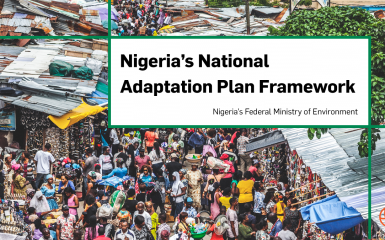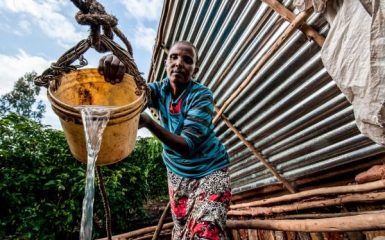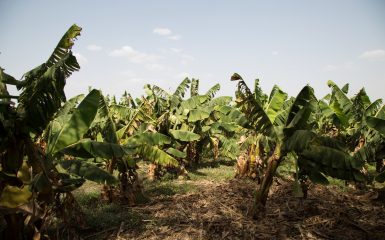Analysis and commentary on the Network’s experiences coordinating climate-resilient development.

What Can We Learn From How Countries Include Education, Children and Youth in Their NAP Processes?
Jennifer Merryweather, Education Specialist, NAP Global Network & Save the Children
To mark the International Day of Education and the power of youth in co-creating education, this article outlines what we can learn from countries that are already including children, youth, and education in their NAP processes.

How Arts, Culture, and Community Engagement Are Driving Climate Resilience in Saint Lucia
By: Danielle Du Bois, National Communications and Stakeholder Engagement Specialist, GCF NAP Readiness Project
Saint Lucia’s national adaptation plan (NAP) process is advancing along two parallel tracks: policy development through engagement and public sensitization.

Perú fortalece su compromiso con la adaptación al cambio climático a través del taller Dialoguemos Multisectorial
Un taller multisectorial reunió a actores clave para coordinar estrategias y aumentar la responsabilidad colectiva para enfrentar el cambio climático en el país.
LIMA, PERÚ — Con resultados clave y consensos alcanzados, culminó el pasado 26 de noviembre el taller “Dialoguemos Multisectorial: Fortaleciendo y articulando la ambición en adaptación al cambio climático con miras al 2030 – 2035”, organizado por el Ministerio del Ambiente (MINAM) a través de la Dirección General de Cambio Climático y Desertificación, con el […]

Building Climate-Resilient Health Systems: Four key actions to follow in National Adaptation Plan (NAP) processes
By Amy Savage (World Health Organization [WHO]), Angie Dazé (IISD), and Elena Villalobos Prats (WHO)
More than a year into the COVID-19 pandemic, we are seeing major disruptions in the delivery of essential health services. As attention shifts to recovery, we have an opportunity to build health systems that are more resilient to future health shocks as well as to the impacts of climate change. National Adaptation Plan (NAP) processes provide a basis for ensuring that this happens.

Botswana’s Pragmatic Approach to a Climate-Proof Economy
Sennye Masike PhD, Environmental Economist, CLIMsystems Ltd
Botswana’s National Adaptation Plan (NAP) framework will contribute to the country’s climate change adaptation efforts by guiding the development of the NAP process and give direction to sectoral initiatives.

Making Adaptation More Effective in Nigeria: Nigeria’s NAP process
Yerima Tarfa (PhD), Director, Climate Change Department, Federal Ministry of Environment, Abuja and Francis Adesina (PhD), Obafemi Awolowo University, Ile-Ife.
The process of developing Nigeria’s National Adaptation Plan Framework has unveiled the challenges in Nigeria’s adaptation programming, particularly showing which issues need attention for a greater impact in the country.

Mainstreaming as a Means for Localizing and Implementing Adaptation Actions
By Kirtiman Awasthi, Somya Bhatt and Ashish Chaturvedi, GIZ India
This process of mainstreaming adaptation has the potential to improve the resilience of development outcomes, enhance community resilience to climate change impact, and safeguard investments.

Resilient Recovery: Using Climate Adaptation Plans to Build Back Better
Anne Hammill
Though focused on climate change, National Adaptation Plans (NAPs) offer important assessments of the risks a country faces and can be valuable in devising more comprehensive pandemic response strategies.

Peruvian Ministry of Environment Launches Participatory Process for the Development of the National Adaptation Plan on Climate Change
Press release | Peruvian Ministry of Environment
On Thursday, November 28th, the Ministry of Environment of Peru held its first meeting towards the participatory process for the development of its climate change National Adaptation Plan (NAP). This guidance document will be Peru’s most important tool for implementing all the actions needed to reduce risks and vulnerability against climate change’s effects while simultaneously […]

Participatory Development of Vulnerability Assessments in Benin, Burkina Faso, and Senegal for Better Adaptation Planning
By Sönke Marahrens, GIZ, Sarah D’haen & Melinda Noblet, Climate Analytics
Vulnerability assessments are an important part of a country’s National Adaptation Planning process, providing evidence for adaptation practitioners to make informed decisions about where adaptation action is needed most. Supported by Climate Analytics through the project “Science-based support for NAP processes in francophone Least Developed Countries of sub-Saharan Africa” (PAS-PNA)[1], the governments of Benin, Burkina […]

Kiribati unveils updated plan for managing climate change and disaster risks during Climate Week
NEW YORK, September 27, 2019 – The Government of the Republic of Kiribati launched its revised Joint Implementation Plan for Climate Change and Disaster Risk Management (KJIP), setting out its ambitions for building Kiribati’s resilience to climate change impacts. The KJIP was launched at a side-event organized by the Republic of Kiribati and the Republic […]

Botswana Commits to 16 Recommendations from Government Stakeholders for its NAP Framework
Botswana’s National Adaptation Plan (NAP) Framework Inception Report will incorporate 16 recommendations collected from the participants of the workshop hosted by the Botswana Ministry of Environment, Natural Resources, Conservation and Tourism, through the Department of Meteorological Services. Held in Gaborone on September 18, the event aimed to raise awareness of the country’s NAP process. The […]